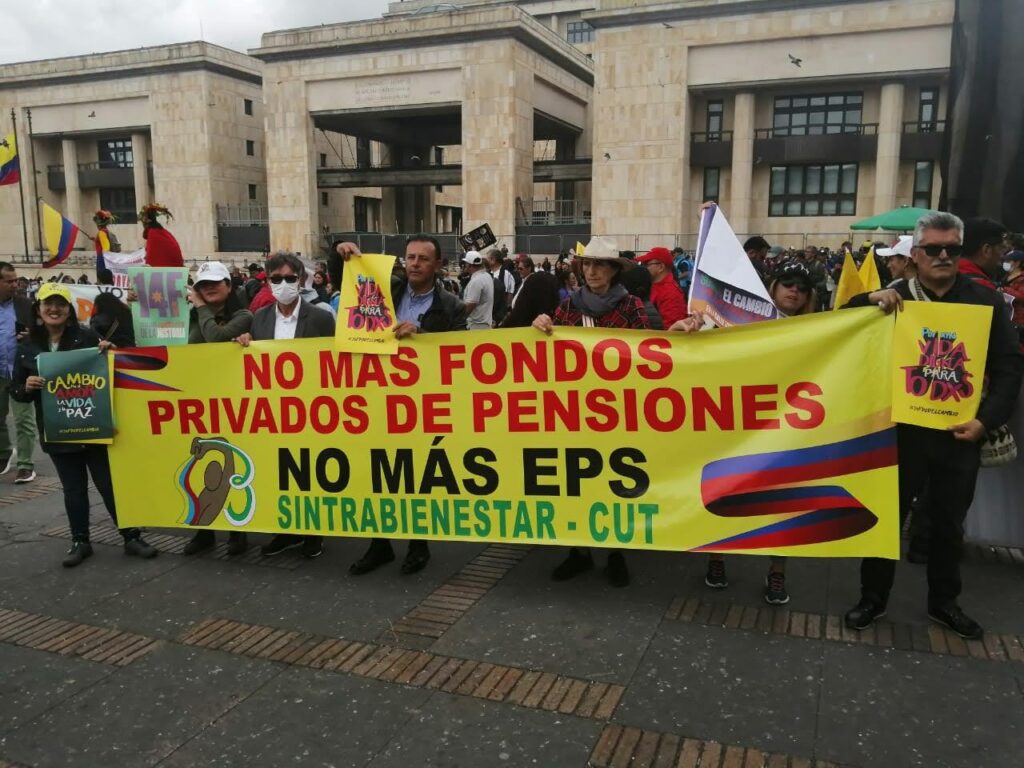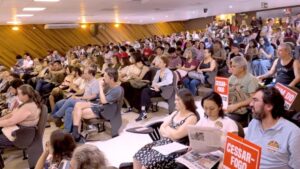
Published 02/15/2023 17:40 | Edited 2/16/2023 3:41 PM
Thousands of people took to the streets of the main cities of Colombia on Tuesday (14) to support the legislative initiatives with which President Gustavo Petro seeks to reform the health and social security systems. Unions of workers, educators and health professionals, among others, responded to the call of the first left-wing government in Colombia and occupied the streets of Bogotá, Medellín, Cali and other cities.
The Colombian government has presented a reform project to create a public and universal system of primary care, which aims to reduce private participation in the system in order to strengthen the capacities of the State. The project “The change for health” was delivered to Congress last Monday (13). “We want to claim the fundamental right to health”, said the minister who leads the portfolio, Carolina Corcho, during the presentation of the project.
Currently, people are served by the private sector, while the state pays for services. With the change, the State would create its own basic and preventive care network, universalizing access. Surveys show that a large portion of the population is satisfied with the current system, although there are gaps in basic and emergency care.
Petro also announced a pension reform that seeks to bring more resources to public coffers and establish a minimum income for the elderly.
President Gustavo Petro called the population to a national demonstration in support of the “social reforms of the government of change”. Another five basic reforms were presented by the government in the first six months of management, namely: tax reform, political reform, reform in the educational system, the national development plan and the “total peace” law.
“Today I’m waiting for you at 4 pm in the Plaza de Armas and in the Plaza de Bolívar and in all the public squares of the country”, said the president on Twitter, who explained his projects in a speech at the government headquarters in Bogotá. “Who won [as eleições] it was the people and the people want change in Colombia. We are going in search of changes for a democratic and peaceful country”, said the president.

The president defended that the current model privileges a view that health is a business and patients are customers. The new law changes the functions of Health Promoting Entities (EPS), which currently act in a similar way to Social Organizations (OSs) in Brazil: private entities that manage primary health care units and regulate consultations, exams and other calls.
The proposal is that the State will be responsible for negotiating contracts with private health service providers and that new EPS will not be created either. In its place, the Primary Health Care Centers (CAPS) will be created with public funding. The idea is to open three thousand CAPS so that each unit serves a group of up to 20 thousand users.
“We are going to transform the system to cover the entire territory, without exceptions, and include all citizens without the need to have a health plan”, said Petro. “What we want is for a doctor to be able to attend to the home of a peasant family, no matter how far away it may be,” he added.
The legislation under discussion also recovers the Single Public Health Fund and gives greater authority to the Health Superintendence to supervise the general budget and also provides for the creation of the National Health Council, which will regulate and supervise health services throughout the country.
correlation of forces
“We are not living in an era of change, but a change of era”, argues the president of the Chamber of Representatives, David Racero (Historical Pact), who is from the same party as President Petro.
The expectation is that the text will be approved in both houses of the National Assembly of Colombia, since the government elected the largest group in the Chamber and in the Senate, and managed to form a qualified majority through alliances with the Liberal Party.
The demonstrations took place on the eve of protests called by the opposition, this Wednesday (15), to precisely reject the reforms that Petro aspires to implement. While government supporters gathered in privileged spaces to listen to the broadcast of the president’s speech, the Uribismo protests were described by the press as disjointed. Leaders of the Colombian right clashed with different times and locations, dispersing supporters. There were riots in some localities, too.
Francisco Maltés, president of the Central Única dos Trabalhadores (CUT), stated that delegates and workers affiliated to the union organization gathered in all the capitals of the country’s departments to support the government’s progressive reforms, “which interpret the needs that workers have had over the last 30 years”.
The Colombian Communist Party also called on its militants to participate in this day, under the motto “Let’s get active in defense of life! For a fairer country. My banner is change”.
Manifestations
When he was mayor of Bogotá, Petro also announced his government’s basic reforms in popular demonstrations.
In January, right-wing parties held demonstrations in the Colombian capital against Petro’s government, criticizing the new policy of “total peace”, which provides for negotiations with irregular armed groups, and the tax reform that proposes to increase taxes on property.
The “total peace” project provides for the judicial submission of the “mafias” that dispute the income from drug trafficking in the country. The initiative provides for reduced penalties for drug traffickers who dismantle their organizations and other benefits, such as keeping 10% of their fortunes, said Justice Minister Néstor Osuna.
Petro also announced a pension reform that seeks to bring more resources to public coffers and establish a minimum income for the elderly.
Source: vermelho.org.br

